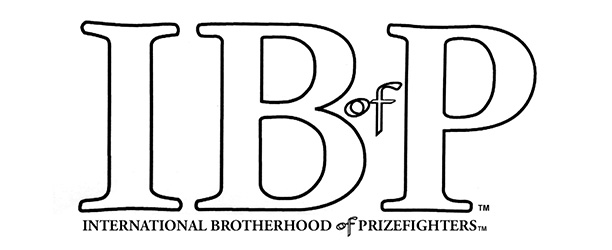Featured Articles
The Fifty Greatest Light-Heavyweights of All Time Part Three – 30-21

The Fifty Greatest Light-Heavyweights of All Time Part Three – 30-21
Those of you who have followed this series from Part One may notice a slight tonal shift in this third entry describing the fifty greatest 175lb fighters of all time. This is due to our arrival, finally, among the ranks of the inarguable. You cannot devise a top fifty at this weight absent any of the names listed from #30 on down – each and every one of these men has an airtight case for inclusion on this list.
It is no coincidence that as we reach this point we also begin to explore in earnest the 1970s but there are representatives here too of another great decade for the light-heavyweight, the 1920s. Two modern inclusions sparkle also, with the twin jewels of longevity and the long ledger of ranked opponents defeated, as opposed to a handful of legendary opponents defeated, that often define modern greatness.
Finally there’s an early visitation from a true legend of the sport, a man who, for me, is the single greatest fighter in history but whose body of work at 175lbs doesn’t demand as high a ranking upon this list as might be imagined. It surprised me – but the work and the criteria that support it tell this division’s story.
#30 – VIRGIL HILL (51-7)
As legendary baseball player Lefty Gomez put it, it’s better to be lucky than good. Virgil Hill benefited from more than a little of both in a career that saw him meet as many fighters ranked at some point in the Ring Magazine top ten as just about anybody on this list. Perhaps the fact that luck kept him safe at times during such a difficult career is more forgivable for that fact.
He stepped up for the first time against the excellent Leslie Stewart, a fight that could have been an extremely dangerous assignment, one that Hill was brave to take on. In truth, Stewart was neatly perched on the edge of old age and two exquisitely timed Hill left hooks tipped him over in four rounds late in 1987. In 1988 and 1989, Stewart went 2-3.
Still, Hill had to do the job and it was feared he might not have the style for it. To put it bluntly, Hill looked every bit the Olympic medallist – the amateur – he was, his weight perched upon his bent leading leg over which he would jab-jab-jab his way to victory. Over time he added a decent right hand, especially to the body but as a converted southpaw, it was always the left that would be his key to victory.
A whole nine years after Stewart, in what may be his defining fight, in Germany, against the world’s then #1 light-heavyweight Henry Maske, Hill was breathless in his amateur stylings despite the addition of that right. He out-peppered Maske in the early rounds, faded in the midsection and by the eleventh was running and clinching enough that it had become embarrassing. Still, he edged that fight on my card 115-113 and astonishingly (there’s that luck again) he was given the decision in a broiling pro-Maske atmosphere. Even more astonishing, this was the second time Hill was awarded an extremely narrow decision over a homeboy having defeated the quality Fabrice Tiozzo, a national hero in France, in his home country in 1993. Tiozzo came close to “finding out” Hill and his amateur style and come the fifth he was just walking in on the American and blasting him. To his credit Hill was so fast and had such a keen sense of when to stand and fight in key rounds that he was able to edge out Tiozzo by a single point for me and by a split decision on the official cards.
He had his fortune at home, too. I thought he was a little lucky to get the nod against speedster Lou De Valle in North Dakota in 1996. Decked by a rather ridiculous counter-left early on, he took on the unfamiliar role of aggressor and at no time looked comfortable, although he was crafty enough to get home for the decision.
Still, there is an awful lot that is impressive in Hill. He recognised his limitations, boxed within them and overstepped them so rarely that it was noticeable when he did so. He won eleven consecutively after smashing a strap out of Stewart, and when it was unceremoniously and rather surprisingly taken from him by Tommy Hearns in 1991 he picked himself up, dusted himself off, and went on another wonderful run terminated only in 1997 by the twin towers of Dariusz Michalczewski and Roy Jones. During those two purple patches Hill out-boxed numerous fighters who held a ranking, and although whenever he stepped into the top five he was usually set for a struggle, the lesser lights and fading stars of the division were generally out-classed, or something like it.
Longevity, a semblance of dominance illustrated right at the end of his time at the top makes Hill was one of the most important light-heavyweights to box between Michael Spinks and Roy Jones.
#29 – JOHN CONTEH (34-4-1)
John Conteh was ranked among the four best light-heavyweights on the planet by Ring Magazine for an astonishing seven years. Such longevity at the very top of the division is almost unheard of, but Conteh established this feat in what was the deepest and strongest light-heavyweight division since World War II.
He was very nearly claimed by the heavyweight division however, and not after he’d done the damage at 175lbs like so many of his peers but before – Conteh cut his teeth on heavyweights and moved down among the smaller men only after his first loss, supposedly upon the advice of Muhammad Ali. He arrived with a splash, crushing incumbent European champion and number five contender, Rudiger Schmidtke in twelve rounds in March of 1973. As always, Conteh collected that title in great style, employing feints (while he himself was almost impossible to feint), jabs (while he himself was almost impossible to outjab) and a spiteful right hand to stop the German in twelve.
These are passing comments on one of the division’s true stylists that hardly capture his essence, however. Conteh’s left-hand should have belonged to a more committed fighter; he was as famous in the UK for shunning his training and his love of the nightlife as he was for his wonderful talents. Both jab and hook were of the absolute highest class and his right, when he dropped it, was a hurtful punch. The right was a Conteh weakness though. He threw it rarely in his later career most especially after breaking it in a car crash, although injuries to both hands plagued him throughout his career. Inactivity married to certain impracticalities in his character also cost him both money and prestige, his refusal to go through with a contest with Miguel Cuello, announced just three days before the fight, hurting him less perhaps than his failure to meet legitimate champion Bob Foster.
Still, Conteh built an excellent resume with his smooth box-punching, besting former beltholder Vicente Rondon in nine, the superb Chris Finnegan who had pushed Bob Foster as hard as he would be during his title run, the hugely experienced Tom Bogs, Jorge Victor Ahumada in his superb strap-winning effort and a defence of that strap in a wonderful fight with Yaqi Lopez.
Unbeaten until the twilight of his career when he was narrowly outfought by both Mate Parlov and Matthew Saad Muhammad, Conteh may not have been so lucky had he hooked up with either Victor Galindez or Foster, but by the time he was stopped for the first time in his career in the rematch with Muhammad, he had already guaranteed himself a place among the greatest and the best light-heavyweights in history.
#28 – BATTLING LEVINSKY (70-20-14; Newspaper Decisions 126-35-23)
The best middleweight just took turns beating up Battling Levinsky in 1911 but when he added pounds and stepped up to the fledgling light-heavyweight division his results improved, a close bout often reported a draw with nemesis Jack Dillon his first reward. Dillon dominated a ten fight series between them, Levinsky managing no better than 2-2-6 by some counts, certainly losing their twin battles for Dillon’s generally recognised light-heavyweight title claim in 1914, but Levinsky crept closer as Dillon began to suffer ring wear, finally dominating and taking from him the title in late 1916. It is the series which trails Levinsky’s growing maturity just as it trails Dillon’s decline.
Levinsky’s problem against Dillon was that he lacked pop, scoring, as he did, only thirty knockouts in nearly three hundred bouts. Dillon over and again would out-punch Levinsky who, while brilliant defensively and expert at avoiding sustained punishment, could not remain ahead of Dillon’s offence entirely.
In the No Decision era, where unofficial rulings were made by attendant newspapermen, this may have been especially hurtful to Levinsky because some accounts of his record did not recognise Newspaper Decisions, listing only the wins he achieved by rare knockout or by official decision in states where they were permitted. This, Levinsky countermanded by a schedule so busy as to be comparable to that of the great Harry Greb, boxing nine times in the first month of 1914 for example.
As well as his eventual victories over Dillon, Levinsky defeated Charley Weinhart, Leo Houck, Bartley Madden, Clay Turner, Gunboat Smith (who also defeated him) and Mike McTigue, but it is a fact that, at light-heavyweight, Levinsky was normally beaten whenever he stepped up in class. Dillon got the best of him, he was repeatedly thrashed by Greb, lost a fight with Young Stribling which was so bad it was suggested that Stribling may have carried him, was beaten in twelve by Gene Tunney who savaged him to the body, and was stopped in four by Georges Carpantier, relinquishing the title to him. Although he mastered Billy Miske up at heavyweight, he was outfought in their single meeting at or around light-heavyweight (also losing a second contest in that range if we stretch our definitions by a pound). In short, the best light-heavyweights tended to beat Levinsky – and I think that this is a fact that is historically ignored by the likes of Nat Fleischer (who ranked him at an astonishing #6 on his ATG list for the weight). I take some comfort in the fact that the IBRO ranked him all the way down at #20, and that Charley Rose left him off his own ATG list, written in the 1960s. It is also true that early in his own career, Levinsky was identified by former heavyweight champion James J Corbett as a fighter who would prosper for the most part only against what he called “second and third raters”. While this is a little stronger than the language I would use, I believe it was born out to a degree.
Still there is no denying that this is my first serious disagreement with boxing history as it is generally held, and I wish to temper troubled waters by stating that Levinsky clearly belongs on this list. His longevity was astounding, having been favoured over Eddie McGoorty in 1912 and relevant to the light heavyweight division as late as 1921 when he defeated the heavily outweighed Mike McTigue. In between, he fought often and well enough that he ranks here over men who have perhaps taken better scalps but cannot match him for complete body of work.
#27 – MARVIN JOHNSON (43-6)
Marvin Johnson was light-heavyweight’s greatest pure thug. By the end of his career, which somehow chugged into the late eighties, making him one of the great survivors of the stacked 1970s division, he was an ancient and rusted battleship that took too long to turn to maintain effectiveness. At his best he brought some of the most direct, wicked pressure in the division’s history, not crafty enough to ever defeat one of the true monsters with whom he shared a ring but devastating enough that anyone else was filleted.
Unfortunately for Johnson he came crashing into the most stacked light-heavyweight division in history. Leslie Stewart, Eddie Davis, Charles Williams, Michael Spinks, Eddie Mustafa Muhammad, Victor Galindez and Mate Parlov all lay in wait, but the first monster he ran up against was Matthew Saad Muhammad. Both men were still prospects (Muhammad a controversial 15-3-2, Johnson 15-0) but they turned in perhaps the greatest fight ever fought at 175lbs. Johnson was beaten by a knockout in the twelfth, the walking dead long before hit the canvas having launched the kind of devastating and absurd attack in the first that always leaves a fighter vulnerable past round seven. Still, it was one of those rare losses that actually enhances a fighters standing such was the degree of heart, punch resistance and persistence that Johnson demonstrated. Their rematch, fought for the strap then in Johnson’s possession almost exactly one year later, was almost as dramatic, Muhammad again the winner, again by stoppage.
Between these two losses, Johnson lifted that strap against the difficult and excellent giant Mate Parlov in Italy. Parlov, who had knocked out Miguel Angelo Cuello for the title before repelling John Conteh in his first defence, was nothing more than target practice for Johnson. The great Victor Galindez lasted barely longer and although faded, watching Galindez, perhaps the division’s greatest matador, duel with Johnson, perhaps the division’s greatest bull is one of the great thrills in boxing. Of course Johnson was never in a bad fight although this was not always for the best of reasons. His jab was perennially under-fuelled and sometimes an outright liability and he was far too easy to hit. Eddie Mustafa Muhammad took advantage of these weaknesses to see him off in eleven, and Michael Spinks threw one of the best punches of his career to see him off in four, but often Johnson rolled over ranked, made men like Eddie Davis as though they weren’t there.
This was the pattern he bowed to in his career, generally losing to the best he fought but dominating or finding out everyone else. Unexpected, winging combination punching, an enormous heart, fearlessness and perhaps the best trailing uppercut at the weight make him one of the most formidable beasts ever to make a career at 175lbs. Many other eras would have made him a great champion.
#26 – DARIUSZ MICHALCZEWSKI (48-2)
Dariusz Michalczewski took the lineal light-heavyweight championship from Virgil Hill in 1997 and did not lose it until 2003 when time and Julio Cesar Gonzalez caught up with him. It does not matter that Ring Magazine gifted Roy Jones their title in appreciation of his brilliance – Michalczewski was the real champion, and you have to go all the way back to the great Archie Moore to find one who ruled for more years.
Of course there the comparisons end. Michalczewski packed in an astonishing fourteen successful defences while on top of the hill. His opposition was sometimes less than inspiring and he certainly didn’t do the damage to the division that Roy Jones managed (as we shall see) but he won his fair share of big fights. Against Virgil Hill he did what Henry Maske couldn’t and solved Hill as early as the second round, unveiling his lack of power and taking risks to cut off the ring on his fleet-footed foe. When Hill tried for volume, Michalczewski just picked punches, unerringly finding the right blow before going right back to his stalk and destroy style. The fight was not close.
He showed more superb adaptions versus ranked stylist Lee Barber, a road-warrior who found himself picked and re-picked by an inexperienced fighter who again and again found a perfect mid-range to outpunch the bigger man in neat, controlled bursts. He needed a granite chin to win a 1999 shootout with Montell Griffin but became only the second man ever to stop the American when referee Joe Cortez interceded as Michalczewski brutalised him against the ropes. Graciano Rocchigiani, who caused Henry Maske all those problems, was battered to the only stoppage loss of his career. Lesser ranked men like Derrick Harmon, Richard Hall and Drake Thadzi tended to be stopped. Michalczewski was dominant like Wladimir Klitschko is dominant and although, like Wladimir, he arguably never had that legacy fight so needed to silence doubters, the many years he spent at the top of the division must be recognised and rewarded.
#25 – TIGER JACK FOX (139-23-12)
Tiger Jack Fox went 0-1-1 against Maxie Rosenbloom up at heavyweight, perhaps unlucky to receive the draw, but their single meeting at 175lbs went the way of one of the greatest fighters never to win the light-heavyweight title. In the fourth round of that meeting, Fox forced Rosenbloom to his knees for a flash knockdown, inevitably landing the harder punches throughout to take a decision characterised by The Spokesman Review as “fairly well received by the crowd.” This was the best result of Fox’s career. He came up short against John Henry Lewis, blasted into unconsciousness by him in just three, which was unfortunate as Lewis held the title to which Fox became the #1 contender.
He came up short, too, against Melio Bettina when he finally got a crack at a strap (if not the legitimate title) in 1939, by which time Fox had been a professional for eleven years. Worse, in the run up to the fight he had received a serious stab wound to the chest. Carl Beckwith of the Washington Afro-American noted a week before the fight that “Fox doesn’t look at all ready” and even had difficulty climbing in and out of the ring. It is typical of the hard-luck stories surrounding top black contenders of this era that when Fox’s shot comes he carries an unusual and debilitating injury into the ring with him. Such was the life of an Afro-American fighter of this era.
Not that Fox was perfect. He was given to stalling and according to the Spokane Daily Chronicle “for all his clowning…he is potentially a great fighter – but this is fair warning…[that fans] would rather see him find a steady pace and stick to it.” Still, he built a superb resume despite the prejudices of the era and his own limitations avenging a loss to Al Gainer over fifteen, destroying former divisional champion Bob Olin in just two, smashing out top contender Leo Kelly in six and generally crushing any of the minor light-heavyweights who dared to step into the ring with him.
Much of his very best work was achieved at heavyweight, and this must be remembered by those hardcore history-buffs that would like to see him higher.
#24 – SAM LANGFORD (179-30-39; Newspaper Decisions 31-14-16)
Sorry, Sam.
In his excellent series for Boxing Scene Cliff Rold ranked Sam Langford at #2 for this weight. Herb Goldman agrees with him exactly. The IBRO rank him one space lower at #3. And here I am telling you Sam Langford is the twenty-fourth greatest light-heavyweight of all time. How can this be justified?
In Part One I wrote:
“[F]ights fought by fighters usually held to be light-heavyweights contested above the light-heavyweight limit, will be considered to have engaged in a heavyweight contest and will not be credited here. As a rough guide, fighters matched at below 164lbs are generally held to have fought a middleweight contest and fighters matched at 180lbs and above are fighting at heavyweight. Also the weight class in question is always defined by the heavier fighter. If a 173lb man is fighting a 203lb man, he is engaging in a heavyweight contest. This list is interested almost exclusively in fights that took place within the light-heavyweight class.”
And I stand by that.
Whatever the criteria used by the IBRO, Boxing Scene or Herb Goldman, matches actually fought in the weight class light-heavyweight are not among them – or at least, fights that were verifiably between light-heavyweights are not among them. Between the vast collection of newspaper articles made available by The Library of Congress, details of Langford’s fight on Boxrec and the superb work put in by Clay Moyle for Sam Langford: Boxing’s Greatest Uncrowned Champion, I have been able to verify just a handful of contests actually fought by Sam Langford at the weight in question. Langford graced the light-heavyweight division for some years in terms of his own weight, but most of the significant fights he fought, even with some allowances made for the fact that the middleweight title was often contested at a lower weight in his era, were against opponents who were in another division, usually heavyweight.
In 1906 he famously weighed in at 156lbs for his meeting with all-time great heavyweight Jack Johnson; he was a middleweight. He made it into the light-heavyweight division in 1908 and met 190lb heavyweight Jim Barry, heavyweight Black Fitzsimmons, two-hundred pounder Joe Jeannette, middleweight journeyman Larry Temple, heavyweight contender Sandy Ferguson…you get the point.
Nevertheless, Langford did enough work that he cannot be ignored all together. He has battered his way into the top twenty-five here based upon his obliteration of Fireman Jim Flynn (KO1), his mauling of the wonderful Jeff Clarke (KO2), a battering of Jack O’Brien from 1911 that barely meets our criteria and a handful of other victories that fall into the correct weight range. Additionally there is the spooky sense that Langford imbues that he might have beaten the majority of the fighters who will make up the top twenty.
For those who feel I am underestimating Langford: I consider him the single greatest fighter of all time pound-for-pound. I think he is greater than Ray Robinson – better than Henry Armstrong, even more extraordinary than Harry Greb; but he achieved only a smidgen of what Harry Greb did in the light-heavyweight division. This is the true reflection of Sam’s wonderful career, and it shouldn’t be coloured by the rainbow of his incredibly performances below and above this division.
It looks horrible and I acknowledge that, but the truth often does.
#23 – YOUNG STRIBLING (223-13-14; Newspaper Decisions 33-3-3)
Young Stribling’s career is an absurdity in so many ways there is likely not enough room here for me to list them all. First among them is that he engaged in around 300 recorded contests (likely many more) and that he was only stopped once, in the fifteenth round, against the borderline great heavyweight Max Schmeling. He was never stopped at the 175lb limit.
More absurd: his one and only crack at the world’s light-heavyweight championship. The title was in the possession of Mike McTigue, an uninspiring figure as a champion and one who retained his title against Stribling in bizarre circumstances. The promoter claimed that ringsiders saw the fight almost universally for Stribling but that the referee refused to render a decision at the end of the ten rounds. Stories circulated that the official was under threat of death, although who was meant to carry out his assassination and for what reason was not made clear – finally the referee buckled and rendered a decision for Stribling. Three hours later he withdrew that decision and called the fight a draw, meaning McTigue would retain his title. The champion claimed to have been sent to the ring “at gunpoint” with a broken hand – with two working hands and nobody pointing a weapon at him, he was firmly out-pointed by Stribling once more the following year in a non-title fight.
Stribling also handed the young Tommy Loughran two “artistic beatings”, split the best end of a pair of no-decisions with Jimmy Delaney, lost a six-rounder to the king of that distance, Jimmy Slattery, but took an uncharacteristically violent revenge upon him some years later, roughing him up on the way to a ten round decision win. He dropped Maxie Rosenbloom on the way to another great victory in 1927, having out-worked an ageing Battling Levinsky the year before. He beat so many greats and champions that fighters like Lou Scozza, key wins for men further down the list, become window-dressing on Stribling’s fabulous record. He kept piling up wins out of the top drawer (and, it must be acknowledged, a huge amount of dross) up until 1933 when he was killed in a motoring accident. He was 28 years old.
In terms of weaknesses, he lacked a certain savagery and certainly in newspaper reports of the time and the scant footage that survives he doesn’t look what the old-time sportswriters would have referred to as “a killer”. But this weakness hardly manifested itself in losses. Judges and newspapers both tended to find for rather than against him, and no light-heavyweight got close to laying him low with punches.
Clever, quick, a stiff puncher with a wonderful fighting-brain, it is one of boxing’s greatest shames that he was never the champion, most especially with his having beaten an incumbent title-holder twice.
#22 – PAUL BERLENBACH (40-8-3; Newspaper Decisions 1-0-0)
Paul Berlenbach was one of light-heavyweight’s finest punchers, thirty-four of the forty-one victories he is credited with coming by way of knockout. He was a ring savage, easy to hit but almost impossible to dissuade, boasting a great chin and one of the most damaging body attacks of the era. A wonderful balance of strength and weakness raised him up onto the cross of great fights. These, Berlenbach delivered, and soon, beginning his terrible rivalry with Jack Delaney (already world class) in just his fifth month as a professional, losing in four rounds. “They practically ruined each other,” boxing correspondent Robert Edgreen would write in 1927, as Berlenbach’s career began to wind down. Practically, Berlenbach coming off the worse as Delaney’s stylistic approach proved the more sustainable, bringing him a clean victory in their desperate series. Berlenbach did have his moment though, successfully defending the world title he had ripped from Mike McTigue in May of 1925 against his nemesis in December of that same year. In the fourth, Delaney landed a “mule-kicking” right to Berlenbach’s jaw the effects of which rippled in the latter’s nervous system as late as the seventh when he seemed in immediate danger of losing his title, and would have in a more civilized era. Spared by the 1920s referee, Berlenbach battled back to drop Delaney in the twelfth and take the narrowest of decisions over the man who had already stopped him and who would stop him again; it was the most important win of his career.
Despite Delaney’s overall domination of him, Berlenbach didn’t suffer as badly with other world-class boxers. Young Stribling, like Delaney, could punch as well as box but he got little out of Berlenbach when they met in the summer of 1926. Berlenbach thrashed him, dishing out what was “the only real beating Stribling had ever taken in his life” according to his lifelong friend Milton Wallace. Frank Getty of United News described Stribling as “a punching bag” and rated him good for only two of the fifteen rounds. Berlenbach, so late to the theatre of pugilism, outhustled and outfought a man groomed for the ring since birth.
Berlenbach also “slaughtered” Battling Siki according to the New York Times, battered out Jimmy Slattery in eleven and out-pointed contender Tony Marullo and if his drop off was sharp, if he went from fistic catastrophe to past-it contender a little too swiftly to be ranked here with the true elite, it is beyond doubt that he deserves to be included in the prestigious company he finds himself in now.
#21 – DWIGHT MUHAMMAD QAWI (41-11-1)
Dwight Muhammad Qawi went just 19-2-1 at light-heavyweight; then he vanished not to heavyweight but to cruiserweight, where he gave Evander Holyfield one of the toughest fights of his career, a war that also happens to be one of the best fighters in history.
Qawi was the light-heavyweight Joe Frazier, a terrifying prospect, comically small at just 5’7 but an educated pressure monster who brought war in the form of punches.
He was too much for Matthew Saad Muhammad. Muhammad is one of the greatest light-heavyweights in history and he lurks somewhere above among the true giants of the division but Qawi kicked hell out of him not once but twice, for the first time in 1981 and then again in 1982. It has been said that Muhammad was past his prime at the time of his first meeting with Qawi, and I have a certain degree of sympathy with that point of view – however, it is worth pointing out that Muhammad came into the Qawi contest on the back of seven straight stoppage victories at title level, including the destructions of John Conteh, Yaqui Lopez and Lottie Mwale. Nevertheless, he did struggle to make weight, and against a fighter whose nickname is Buzzsaw, draining is never going to make for a particularly pleasant night. Qawi’s plan was to move across Muhammad, bringing the pressure that made him so dangerous but doing it with angles, attempting to stay ahead of the beltholder while opening up his body. It worked. From the first Qawi is landing jabs to the body and making room for his right hand, from the start Muhammad strained to find him. He may have won the first; Qawi took every other round before stopping him with truly chilling show of precision and calm. Their rematch, fought nine months later, was even more one-sided.
Between his matches with Muhammad, Qawi crushed the excellent Eddie Davis, having already twice avenged a controversial, perhaps even nonsensical defeat to his namesake, Johnny Davis. Mike Rossman, who had once defeated the great Victor Galindez, managed just seven rounds before he succumbed. James Scott, who had famously defeated Eddie Mustafa Muhamad behind the walls of Rahway State Prison did less well when Qawi signed the visitors book. It was speculated that Eddie Mustafa had been intimidated by his surroundings and perhaps even by Scott; it was Scott who uncharacteristically went on the run in the first however, Qawi following with a sick grin. A unanimous decision soon followed.
The other man to have bested Scott was Jerry Martin. Qawi tracked him down and stopped him in six. Qawi wasn’t at light-heavy long, but while he was, contenders tip-toed past, holding their breath.
Featured Articles
Ramon Cardenas Channels Micky Ward and KOs Eduardo Ramirez on ProBox
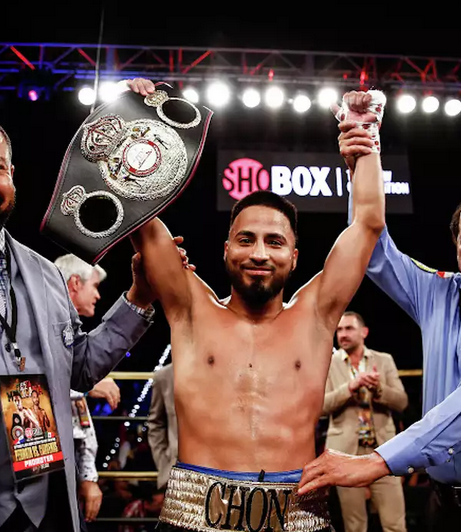
The Wednesday night bi-monthly series of fights on the ProBox TV platform is the best deal in boxing; the livestream is free with no strings attached! Tonight’s episode was headlined by a super bantamweight match between San Antonio’s Ramon Cardenas and Eduardo Ramirez who brought a caravan of rooters from his hometown in Guaymas, Sonora, Mexico.
Cardenas, coached by Joel Diaz, entered the contest ranked #4 by the WBA. He was expected to handle Ramirez with little difficulty, but this was a close, tactical fight through eight frames when lightning struck in the form of a left hook to liver the from Cardenas. Ramirez went down on one knee and wasn’t able to beat the count. It was as if Cardenas summoned the ghost of Micky Ward who had a penchant for terminating fights with the same punch that arrived out of the blue.
The official time was 1:37 of round time. Cardenas improved to 25-1 with his14th win inside the distance. Ramirez, who was stopped in the opening round by Nick “Wrecking” Ball in London in his lone previous fight outside Mexico, falls to 23-3-3.
Co-Feature
In an upset, Tijuana super welterweight Damian Sosa won a split decision over previously undefeated Marques Valle, a local area fighter who was stepping up in class in his first 10-round go. Sosa was the aggressor, repeatedly backing his taller opponent into the ropes where Valle was unable to get good leverage behind his punches.
The 25-year-old Valle, managed by the influential David McWater, was the house fighter. This was his 10th appearance in this building. He brought a 10-0 (7) record and was hoping to emulate the success of his younger brother Dominic Valle who scored a second-round stoppage of his opponent in this ring two weeks ago, improving to 9-0. But Sosa, who brought a 24-2 record, proved to be a bridge too high.
The judges had it 97-93 and 96-94 for the Tijuana invader and a disgraceful 98-92 for the house fighter.
Also
In a fight whose abrupt ending would be echoed by the main event, 34-year-old SoCal featherweight Ronny Rios, now training in Las Vegas, returned to the ring after a 22-month hiatus and scored a fifth-round stoppage over Nicolas Polanco of the Dominican Republic.
A three-punch combo climaxed by a left hook to the liver took the breath out of Polanco who slumped to his knees and was counted out. A two-time world title challenger, Rios advanced to 34-4 (17 KOs). Polanco, 34, declined to 21-6-1. The official time was 0:54 of round five.
—
The next ProBox show (Wednesday, May 8) will have an international cast with fighters from Kazakhstan, Japan, Mongolia, and the United Kingdom. In the main event, Liverpool’s Robbie Davies Jr will make his U.S. debut against the California-based Kazakh Sergey Lipinets.
To comment on this story in the Fight Forum CLICK HERE
Featured Articles
Haney-Garcia Redux with the Focus on Harvey Dock
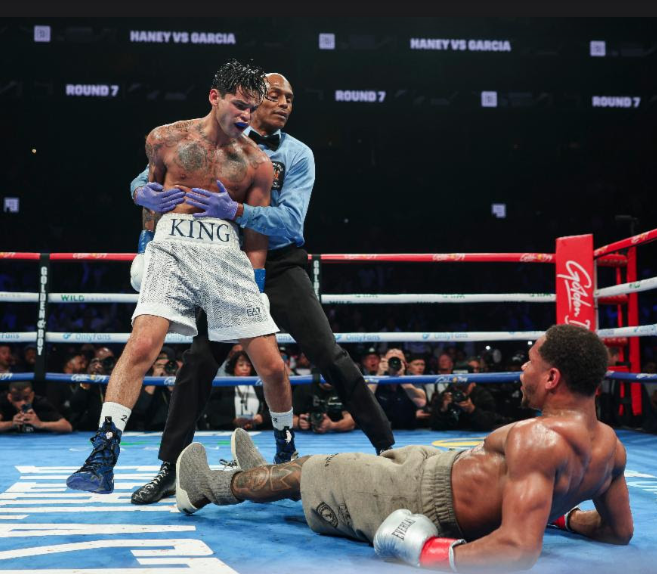
Saturday’s skirmish between Ryan Garcia and WBC super lightweight champion Devin Haney was a messy affair, and yet a hugely entertaining fight fused with great drama. In the aftermath, Garcia and Haney were celebrated – the former for fooling all the experts and the latter for his gallant performance in a losing effort – but there were only brickbats for the third man in the ring, referee Harvey Dock.
Devin Haney was plainly ahead heading into the seventh frame when there was a sudden turnabout when Garcia put him on the canvas with his vaunted left hook. Moments later, Dock deducted a point from Garcia for a late punch coming out of a break. The deduction forced a temporary cease-fire that gave Haney a few precious seconds to regain his faculties. Before the round was over, Haney was on the deck twice more but these were ruled slips.
The deduction, which effectively negated the knockdown, struck many as too heavy-handed as Dock hadn’t previously issued a warning for this infraction. Moreover, many thought he could have taken a point away from Haney for excessive clinching. As for Haney’s second and third trips to the canvas in round seven, they struck this reporter – watching at home – as borderline, sufficient to give referee Dock the benefit of the doubt.
In a post-fight interview, Ryan Garcia faulted the referee for denying him the satisfaction of a TKO. “At the end of the day, Harvey Dock, I think he was tripping,” said Garcia. “He could have stopped that fight.”
Those that played the rounds proposition, placing their coin on the “under,” undoubtedly felt the same way.
The internet lit up with comments assailing Dock’s competence and/or his character. Some of the ponderings were whimsical, but they were swamped by the scurrilous screeching of dolts who find a conspiracy under every rock.
Stephen A. Smith, reputedly America’s highest-paid TV sports personality, was among those that felt a need to weigh-in: “This referee is absolutely terrible….Unreal! Horrible officiating,” tweeted Stephen A whose primary area of expertise is basketball.
Harvey Dock
Dock fought as an amateur and had one professional fight, winning a four-round decision over a fellow novice on a show at a non-gaming resort in the Pocono Mountains of Pennsylvania. He says that as an amateur he was merely average, but he was better than that, a New Jersey and regional amateur champion in 1993 and 1994 while a student New Jersey’s Essex County Community College where he majored in journalism.
A passionate fan of Sugar Ray Leonard, he started officiating amateur fights in 1998 and six years later, at age 32, had his first documented action at the professional level, working low-level cards in New Jersey. The top boxing referees, to a far greater extent than the top judges, had long apprenticeships, having worked their way up from the boonies and Dock is no exception.
Per boxrec, Haney vs Garcia was Harvey Dock’s 364th assignment in the pros and his forty-second world title fight. Some of those title fights were title in name only, they weren’t even main events, but, bit by bit, more lucrative offerings started coming his way.
On May 13, 2023, Dock worked his first fights in Nevada, a 4-rounder and then a 12-rounder on a card at the Cosmopolitan topped by the 140-pound title fight between Rolly Romero and Ismael Barroso. It was the first time that this reporter got to watch Dock in the flesh.
Ironically (in hindsight), the card would be remembered for the actions of a referee, in this case Tony Weeks who handled the main event. Barroso was winning the fight on all three cards when Weeks stepped in and waived it off in the ninth round after Romero cornered Barroso against the ropes and let loose a barrage of punches, none of which landed cleanly. Few “premature stoppages” were ever as garishly, nay ghoulishly, premature.
With all the brickbats raining down on Weeks, I felt a need to tamp down the noise by diverting attention away from Tony Weeks and toward Harvey Dock and took to the TSS Forum to share my thoughts. Referencing the 12-rounder, a robust junior welterweight affair between Batyr Akhmedov and Kenneth Sims Jr, I noted that Dock’s Las Vegas debut went smoothly. He glided effortlessly around the ring, making him inconspicuous, the mark of a good referee. (This post ran on May 15, two days after the fight.)
Folks at the Nevada State Athletic Commission were also paying attention. Dock was back in Las Vegas the following week to referee the lightweight title fight between Devin Haney and Vasyl Lomachenko and before the year was out, he would be tabbed to referee the biggest non-heavyweight fight of the year, the July 29 match in Las Vegas between Terence Crawford and Errol Spence Jr.
The Haney-Garcia fight wasn’t Harvey Dock’s best hour, I’ll concede that, but a closer look at his full body of work informs us that he is an outstanding referee.
—
While the Haney-Garcia bout was in progress, WBC president Mauricio Sulaiman threw everyone a curve ball, tweeting on “X” that Devin Haney would keep his title if he lost the fight. Everyone, including the TV commentators, was under the impression that the title would become vacant in the event that Haney lost.
Sulaiman cited the precedent of Corrales-Castillo II.
FYI: The Corrales-Castillo rematch, originally scheduled for June 3, 2005 and aborted on the day prior when Castillo failed to make weight, finally came off on Oct. 8 of that year, notwithstanding the fact that Castillo failed to make weight once again, scaling three-and-a-half pounds above the lightweight limit. He knocked out Corrales in the fourth round with a left hook that Las Vegas Review-Journal boxing writer Kevin Iole, alluding to the movie “Blazing Saddles,” described as Mongo-esque (translation: the punch would have knocked out a horse). After initially insisting on a rubber match, which had scant chance of happening, WBC president Jose Sulaiman, Mauricio’s late father, ruled that Corrales could keep his title.
Whether or not you agree with Mauricio Sulaiman’s rationale, the timing of his announcement was certainly awkward.
Haney’s mandatory is Spanish southpaw Sandor Martin (42-3, 15 KOs), a cutie best known for his 2021 upset of Mikey Garcia. A bout between Haney and Martin has the earmarks of a dull fight.
To comment on this story in the Fight Forum, CLICK HERE
Featured Articles
In a Shocker, Ryan Garcia Confounds the Experts and Upsets Devin Haney
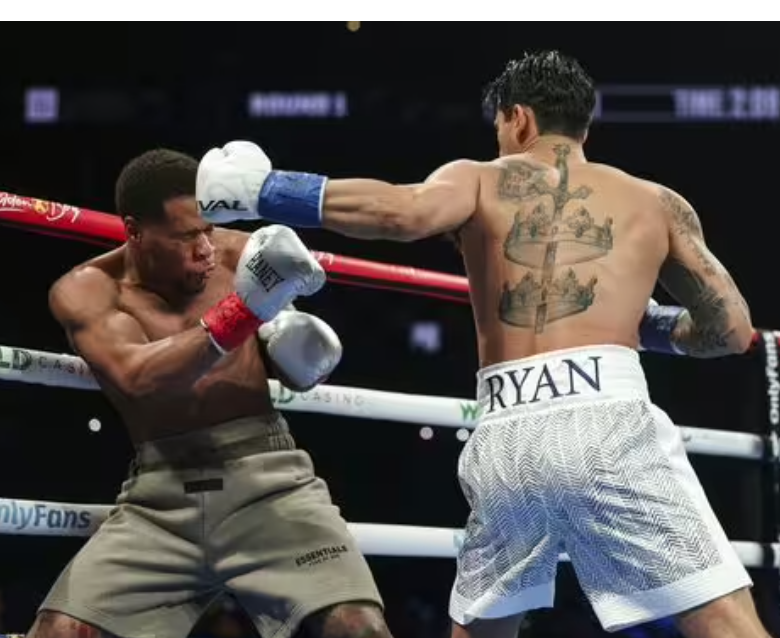
Its good to be crazy. Like a fox.
Ryan “KingRy” Garcia knocked down WBC super lightweight titlist Devin Haney three times to remind everyone of his fighting abilities in winning by majority decision on Saturday.
“I just knew what I could do,” Garcia said.
Fans will not forget the lanky kid from Victorville, California now.
Garcia (25-1, 20 KOs) fooled everyone in playing crazy weeks before the fight, then showed shocking power to hand Haney (30-1, 15 KOs) his first loss as a professional at Barclays Center in Brooklyn.
Haney’s WBC super lightweight title was not at stake for Garcia because he weighed three pounds over the limit.
After Garcia seemingly acting out of control on social media, Haney’s guard must have slipped in the first round during the first few seconds as Garcia connected with that hellish left hook and Haney, with a look of shock in his eyes, almost went down. He barely survived the first round.
“He caught me with it,” said Haney.
During the next few rounds, Haney proceeded to advance toward Garcia seemingly fully aware of the lethal left hook. He used feints and rights to score with a busier approach as Garcia seemed cocked and ready to counter with a left hook.
In the fourth round it seemed Haney was confident he had regained control of the fight, but every time he opened up with more than a two-punch combination Garcia reminded him whose hands were faster and more dangerous.
Though Garcia seldom jabbed he seemed bent on looking for the right moment to unleash his deadly left hook. And every time the Southern California fighter opened up with a combination he scored and Haney dare not exchange.
A few times Haney smiled as if signifying he escaped.
In the seventh round Haney looked to punish Garcia’s body and instead was met with a three-punch combination included a left hook to the chin and down went Haney slumped on the ground. He managed to beat the count and as soon as Garcia came within reach Haney wrapped his arms around him with a python grip. Despite the warnings by referee Harvey Dock, the fallen fighter would not release and Garcia impatiently fired a weak punch during the break. The referee deducted a point from Garcia though he could have deducted a point from Haney for not obeying his instructions to release his hold. Haney actually went down three times in the round but only one was counted by the referee.
From that point on Haney was very cautious but still looking to win by decision.
Though Garcia kept using a shoulder-roll defense that left his body exposed, he would retaliate with three and four punch combinations that usually Haney could defend against other fighters.. But Garcia’s blazing combinations were too fast to defend.
In the 10th round Haney looked to attack and was countered by Garcia’s right and a blinding left hook to the chin and another two blows that sent the former undisputed lightweight champion to the floor again.
It didn’t look good for Haney to survive.
Garcia walked into the 11th round still composed and never out-of-control He dared Haney to exchange and when within striking distance Garcia unleashed another lightning combination and down went Haney again with a defeated look.
Both fighters had fought each other as amateurs six times so there were no surprises between them. But Garcia’s power and speed were superior and that was the difference in a professional fight.
In the final round both were cautious with Garcia’s combination punching proving too dangerous for Haney to open up. Garcia celebrated early as the round ended confident of victory.
After 12 rounds Garcia was seen the victor by majority decision 112-112, 114-110, 115-109.
“You really thought I was crazy,” Garcia told the interviewer and the crowd. “You guys hated on me.”
Other Bouts
Arnold Barboza (30-0) won a curious split decision victory over United Kingdom’s Sean McComb (18-2) in a 10-round super lightweight fight. McComb’s long reach and busy southpaw style gave Barboza trouble. But he managed to win the fight though the crowd was not pleased.
Bektemir Melikuziev (14-1, 10 KOs) defeated France’s Pierre Dibombe (22-1-1) by technical decision after eight rounds due to a cut on his eye from an accidental head butt. It was a very competitive super middleweight fight.
Costa Rica’s David Jimenez (16-1, 11 KOs) outworked John “Scrappy Ramirez (13-1, 9 KOs) in a 12-round scrap to upset the Los Angeles based fighter. After a few close rounds Jimenez simply bullied his way inside and forced Ramirez against the ropes and unloaded his guns.
After 12 rounds two judges saw it 117-111 and 116-114 all for Jimenez.
“I’m a hard-working man from Cartago I come from nothing,” said Jimenez. “My corner told me I had to work inside.”
Charles Conwell (19-0, 14 KOs) stepped on the gas early with vicious body shots and uppercuts and blasted through the resilient Nathaniel Gallimore (22-8-1, 17 KOs) for several rounds. After a brutal fifth and sixth round the referee halted the one-side beating in favor of Conwell who was fighting for the first time under the Golden Boy banner.
Another winner was Sergiy Derevyanchenko (15-5) by decision over Vaughn Alexander (18-11-1) in a super middleweight match.
To comment on this story in the Forum CLICK HERE
-
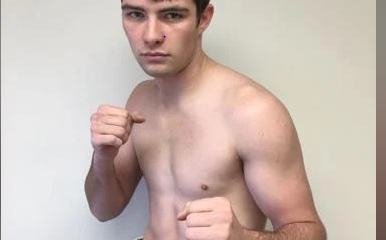
 Featured Articles5 days ago
Featured Articles5 days agoIn a Massive Upset, Dakota Linger TKOs Kurt Scoby on a Friday Night in Atlanta
-
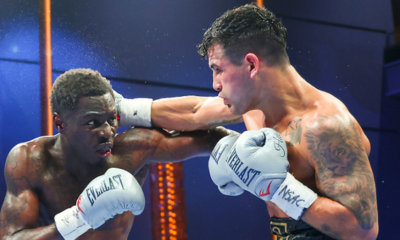
 Featured Articles3 weeks ago
Featured Articles3 weeks agoHitchins Controversially Upends Lemos on a Matchroom Card at the Fontainebleau
-
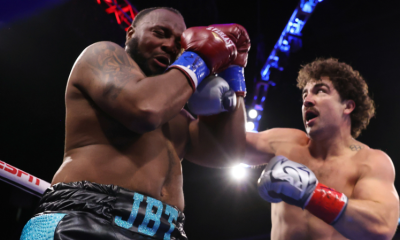
 Featured Articles4 weeks ago
Featured Articles4 weeks agoUndercard Results from Arizona where Richard Torrez Jr Scored Another Fast KO
-
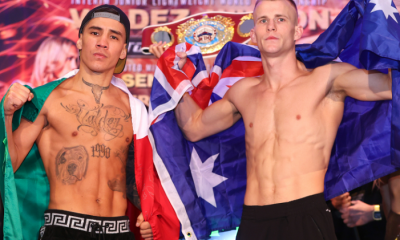
 Featured Articles4 weeks ago
Featured Articles4 weeks agoAvila Perspective, Chap. 278: Clashes of Spring in Phoenix, Las Vegas, and LA
-

 Featured Articles4 weeks ago
Featured Articles4 weeks agoZurdo Ramirez Accomplishes Another First; Unseats Cruiser Titlist Goulamirian
-

 Featured Articles3 weeks ago
Featured Articles3 weeks agoAvila Perspective, Chap. 280: Oscar Valdez, One of Boxing’s Good Guys, and More
-
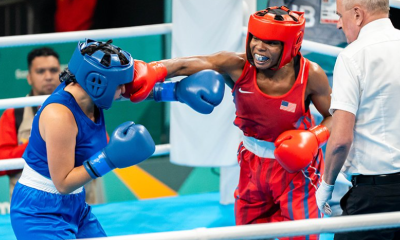
 Featured Articles3 weeks ago
Featured Articles3 weeks agoThe Hauser Report: Literary Notes and More
-
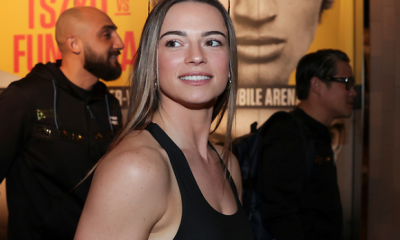
 Featured Articles3 weeks ago
Featured Articles3 weeks agoThe Sky is the Limit for Globetrotting Aussie Featherweight Skye Nicolson

